
At the tender age of eight, Krishna orchestrated the enchanting Rasa Lila with the Gopis, the milkmaids of Vrindavan. It unfolded under the ethereal glow of Sharad Purnima, an autumn night illuminated by the majestic full moon. The moonrise imbued the surroundings with a reddish hue, akin to the red vermillion powder used to adorn a wife when her long-separated husband returns. The eastern sky became a canvas painted with a reddish tint, as if the moon was smearing it with a brush dipped in crimson. When Krishna beheld the full moon night of the sharad season adorned with a variety of seasonal flowers, particularly the fragrant mallika flowers, He recollected the gopis’ entreaties to Goddess Katyayani. In their prayers, they beseeched Krishna to become their husband. He perceived that the full moon night of autumn was a fitting occasion for an exquisite dance. Therefore, He envisioned that fulfilling their aspiration of having Him as their spouse would be aptly realized.
As the moon graced the heavens, Krishna’s yearning to dance with the Gopis surged. The forests exhaled the fragrance of blossoming flowers, and an aura of festivity wrapped the atmosphere in its cool embrace. The melody of Krishna’s flute enchanted the gopis of Vrindavan. The moon’s ascent, the horizon’s red glow, the tranquil coolness of the air, and the blooming flowers amplified their attraction to the flute’s tune a thousandfold. These Gopis were inherently drawn to Krishna’s beauty. The flute’s notes seemingly awakened their latent desires, manifesting as a yearning to gratify Krishna’s senses.
Gopis Hasten to Krishna: Forsaking Worldly Roles for Transcendent Yearning
Upon hearing the flute’s beckoning, the Gopis swiftly abandoned their engagements and converged toward Krishna’s location at Vamsi vata (Vamsi-flute, vata-banyan tree). Their earrings swung rhythmically as they dashed, leaving behind half-done tasks. Some abandoned milking cows midway, leaving the milk pans on stoves to rush to Krishna. One Gopi had just placed milk on a stove, yet without hesitation, she left, unconcerned even if the milk spilled. Others were breastfeeding infants or serving meals to their families, yet they abandoned these roles in haste to approach Krishna. Some were attending to their husbands or having their own meals, but these duties no longer held their attention. A few wished to adorn themselves and apply cosmetics before meeting Krishna, but urgency triumphed; their hastily applied cosmetics appeared haphazard, and their clothes were draped unconventionally.
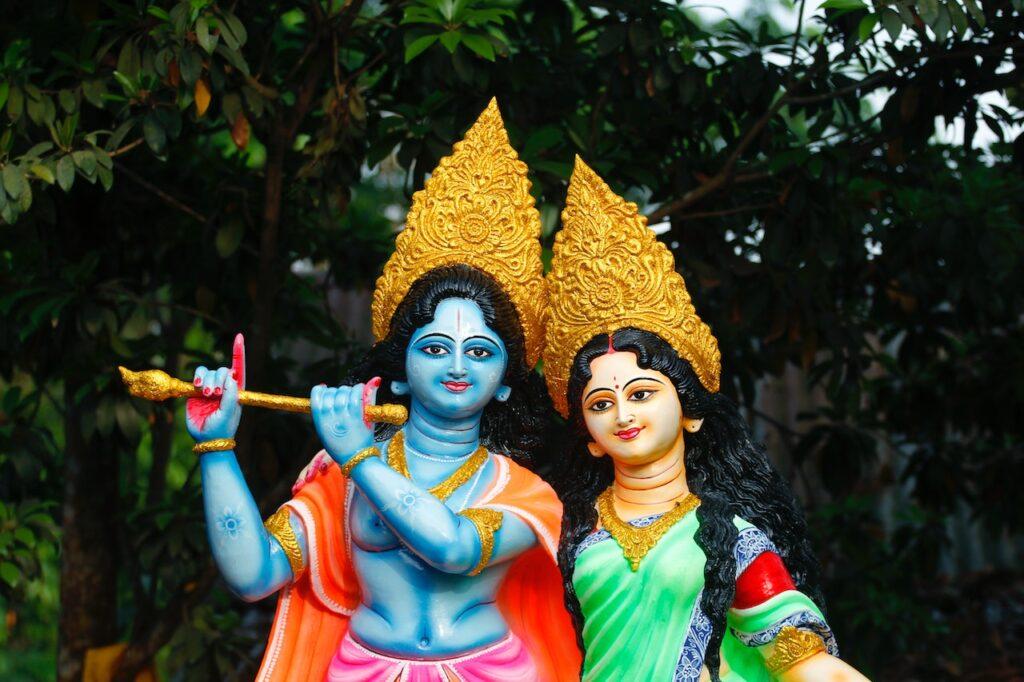
As the Gopis hurriedly vacated their designated spaces, their husbands, brothers, and fathers were left astonished, questioning their destination. Bound by tradition and protection, these young girls were guarded by husbands, elder brothers, or fathers. These guardians adamantly forbade them from reaching Krishna, yet their devotion surged past these barriers. In the grip of Krishna consciousness, worldly duties lost their grip, offering respite from all mundane concerns.
Certain Gopis, held back by their husbands, were forcibly confined within chambers, unable to reach Krishna physically. Nonetheless, they embarked on a mental journey, meditating upon His transcendental form with closed eyes. For those Gopis prevented from physically joining Krishna, their intense yearning caused a profound agony that scorched away all impious karma. Through meditation, they felt His embrace and the resulting ecstasy obliterated their material piety. Despite being the Supreme Soul, Krishna was to them a beloved male companion, and in this intimate mood, they associated with Him. Thus, their karmic shackles shattered, and they shed their gross material bodies.
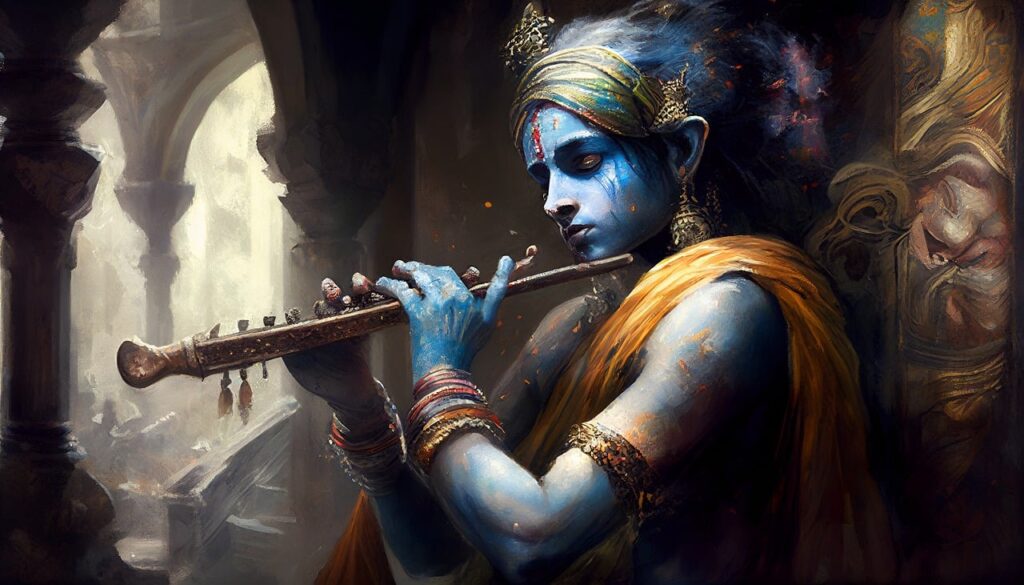
Analogously, from a metallurgical perspective, gold and iron are both metals, yet they significantly differ in quality. Likewise, although the rasa dance and Lord Krishna’s association with the gopis might outwardly resemble ordinary mingling between young men and women, the intrinsic nature is vastly dissimilar. This distinction is discerned by eminent Vaishnavas who can perceive the disparity between Krishna’s divine love and mundane lust. Krishna’s rasa dance takes place on the plane of yogamaya, not Mahamaya. On the Mahamaya level, dancing occurs primarily for the gratification of the senses. However, when Krishna summoned the gopis by playing His flute, they hastened toward the rasa dance site with a transcendental yearning to please Him. Activities conducted for personal sense pleasure are termed material, whereas activities executed to satisfy Krishna are deemed spiritual. Both platforms involve the principle of sense enjoyment, yet on the spiritual plane, it is directed toward the Supreme Lord, while on the material plane, it serves the performer’s desires.
Gopis’ Silent Agony in the Face of Krishna’s Caution
With the Gopis gathered as described, Krishna addressed them, a mix of welcome and discouragement tinging His words. “Ladies of Vrindavan,” He began, “you are truly fortunate, dear to Me. I am delighted by your presence and hope all is well in Vrindavan. Now, please instruct Me. How can I assist you? Why have you come here on this moonlit night? Take your seats, and let Me know your desires.”
The Gopis had come to Krishna seeking joy in His company, to dance, embrace, and kiss Him. However, Krishna’s formal demeanor caught them off guard. He interacted with them akin to conventional society women. While they listened with eagerness to His words, bemusement stirred within them. Krishna proceeded to offer guidance, cautioning them about the dangers of the forest at that hour. Tigers, bears, jackals, and wolves roamed, making it perilous. He urged them to turn back, concerned for their safety.
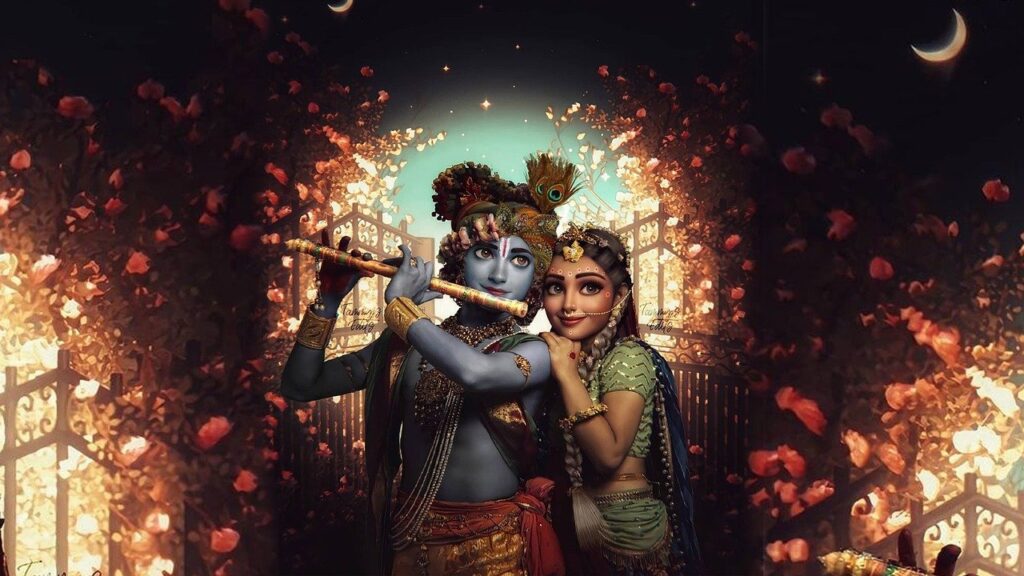
He continued, saying that their families must be anxious about their whereabouts, having left without permission. Their mothers, fathers, brothers, sons, and husbands were likely searching, their minds agitated. Krishna advised them to return promptly and bring solace to their families. He described the beauty of Vrindavan, its fragrant air, trembling leaves, and the Yamuna’s breeze. He suggested they return to their roles—chaste wives, nurturing mothers—and emphasized that proximity to Him didn’t ensure spiritual advancement. Thus, Krishna implored them to return home.
Krishna’s discouraging words saddened the Gopis, fearing their cherished desire to partake in the rasa dance might be thwarted. Their anxiety surged, reflected in their heavy breaths. They lowered their heads, drawing intricate patterns on the ground with their toes, a mixture of tears and cosmetic remnants staining their faces. Their long-awaited rendezvous with Krishna seemed jeopardized, and they stood silently. Their silence resonated with the pain of wounded hearts.
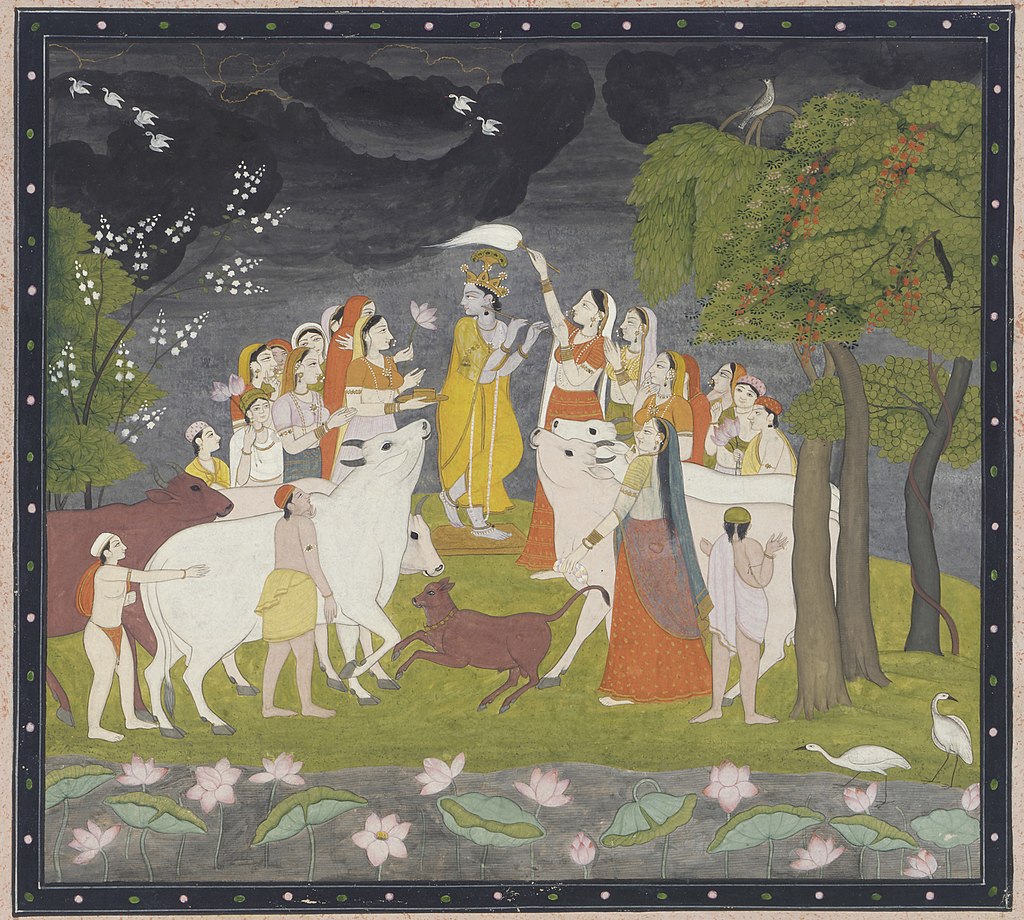
Yet, these Gopis were no ordinary women; they shared an intrinsic bond with Krishna. Their association with Him was beyond the mundane, as they were His eternal companions. Their surrender and dedication were complete. While Krishna’s words had wounded them, they hesitated to respond with harshness, as their relationship was far dearer. Speaking with quivering voices, they expressed their pain, refraining from criticism.
Gopis’ Yearning for Krishna’s Shelter
“Krishna,” they implored, “Your words are harsh. Please reconsider. We are devoted souls seeking shelter in Your lotus feet. We understand Your sovereignty, but rejecting us seems unjust. We left all to find refuge in You. You’re independent, and we beseech You, do not spurn us. Accept us as Lord Narayana accepts His devotees. Just as many worship Lord Narayana for salvation and find it, how can You reject us, your helpless devotees?
“Beloved Krishna,” they continued, “Your supremacy as a teacher is indisputable. There is no room for doubt. Your guidance for women to be loyal to their husbands, compassionate toward their children, efficient in managing household matters, and respectful toward their elders conforms perfectly with the scriptures’ principles. Yet, we understand that by seeking refuge in Your lotus feet, one can impeccably adhere to these scriptural instructions. Our husbands, friends, kin, and children are endearing and delightful solely because of Your presence. You are the Supersoul animating all living beings. Without Your presence, life holds no value. As the scriptures mandate, when You depart, the body ceases to exist, necessitating its disposal through immersion in a river or cremation. Hence, at the heart of this world, You remain our dearest. By instilling our faith and affection in You, we secure the perpetual company of husbands, friends, sons, and daughters. Embracing You as the ultimate spouse, the transient roles of separation, divorce, or widowhood cease to perturb us. You stand as the eternal husband, son, friend, and master. To engage in a relationship with You is to abide in eternal bliss. Being the teacher of all ethical principles, it’s only fitting to revere Your lotus feet above all.”
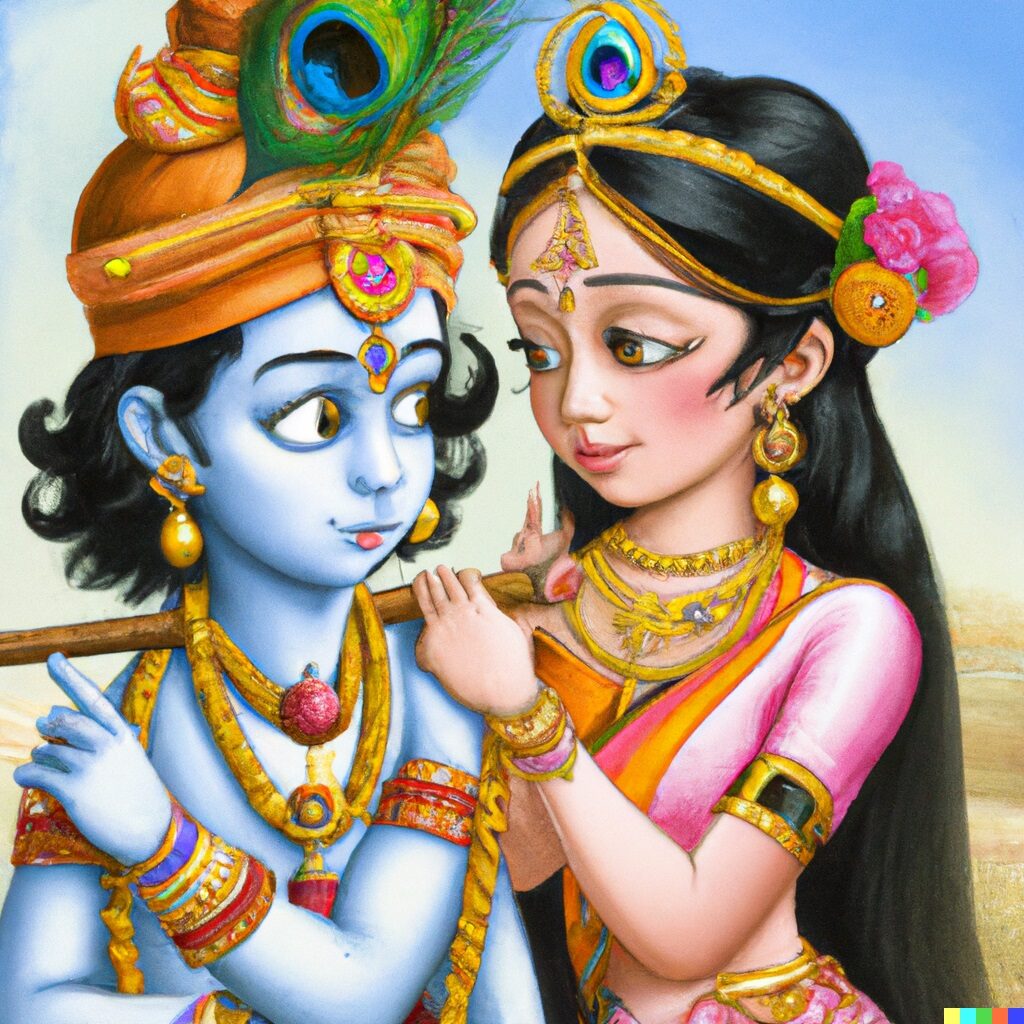
Addressing lotus-eyed Krishna, the Gopis implored, “Kindly, do not quell our long-nurtured aspirations to be united with You as our husband. Those with discernment direct their affection toward You for their own welfare. Individuals misled by the illusory energy chase hollow notions of pleasure, attempting to derive satisfaction apart from You. In this material realm, no one attains genuine happiness through relationships such as father, mother, husband, son, daughter, or friend. Although parents are supposed to shield their children, many children languish in deprivation of food and shelter. While competent physicians abound, they remain powerless to resurrect a deceased patient. Various forms of protection exist, but when destiny seals one’s fate, these defenses crumble. In the absence of Your shelter, these so-called protectors perpetuate distress. Hence, we beseech You, dear Lord of all lords, do not thwart our enduring desires to unite with You as our supreme husband.”
Witnessing Your visage framed by cascading locks, adorned cheeks graced by earrings, nectar-laden lips, and Your smile that beams with sweetness, we cannot help but surrender as Your maidservants. Admiring Your strong arms that dispel fear and Your chest, the ultimate source of pleasure for the goddess of fortune, we willingly embrace servitude. Dearest Krishna, when Your melodious flute, like a spellbinding incantation, bewitches the hearts of women across the three realms, who could remain steadfast in their righteous conduct? Your unparalleled beauty blesses all three worlds with auspiciousness. Even the cows, birds, trees, and deer exhibit the ecstatic sign of standing hairs when they behold Your captivating form. We have none but Your lotus feet to seek solace.” The Gopis’ heartfelt appeal resonated, swaying Krishna. He who was the Lord of Yoga, master of mystic arts, tenderly reciprocated their emotions, joining them in their quest for joy.
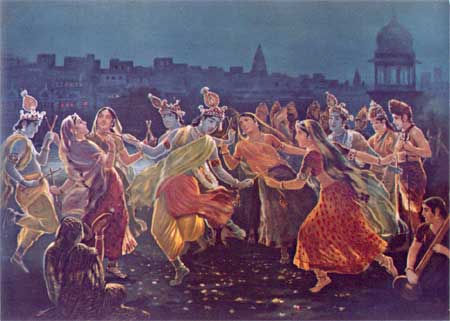 Amid the gathered Gopis, Krishna shone like the moon, encircled by stars. His glances, filled with affection, painted smiles on their faces, while His jasmine petal-like teeth sparkled. He, who embodied magnanimity, responded to their hymns with resonant song. Donning a Vaijayanti garland, He moved amidst the Gopis, embellishing the Vrindavan forest. Krishna embraced the Gopis, setting Cupid’s flames alight with His touch, jests, glances, and laughter. In this symphony of emotions, the Lord reveled.
Amid the gathered Gopis, Krishna shone like the moon, encircled by stars. His glances, filled with affection, painted smiles on their faces, while His jasmine petal-like teeth sparkled. He, who embodied magnanimity, responded to their hymns with resonant song. Donning a Vaijayanti garland, He moved amidst the Gopis, embellishing the Vrindavan forest. Krishna embraced the Gopis, setting Cupid’s flames alight with His touch, jests, glances, and laughter. In this symphony of emotions, the Lord reveled.
The Beloved Vanishes: Krishna’s Enigmatic Departure
In the midst of the gathered Gopis, the unwavering Lord Krishna resembled the moon amid a cluster of stars. His expansive deeds filled their countenances with radiant joy through His tender glances, while His wide smiles illuminated the surroundings like the glow of jasmine petals. While the Gopis sang His praises, that eminent leader of countless women responded fervently with his own melodious song. Donned in his Vaijayanti garland, he graced the Vrindavan forest with his presence, adding to its beauty. Accompanied by the Gopis, Sri Krishna ventured to the banks of the Yamuna, where the sand offered its cooling embrace, and the breeze, invigorated by the river’s ripples, carried the scent of lotuses. Here, Krishna encircled the Gopis with his arms, embracing them tenderly. His touch, playful banter, enchanting glances, and shared laughter awakened Cupid in the charming young women of Vraja. In this manner, the Lord reveled in his divine pastimes. The Gopis swelled with pride, basking in the extraordinary attention showered upon them by Krishna, the Supreme Personality of Godhead. Each believed herself to be the most blessed woman on Earth. Perceiving the Gopis’ growing sense of pride, Lord Keśava sought to alleviate this sentiment and extend his compassion. Thus, in an instant, he vanished from their sight.
Gopis Search for Krishna
When Sri Krishna suddenly vanished from the midst of the rasa dance, the gopis, their thoughts consumed by Him, embarked on a quest to find Him across the various forests. From creatures animate and still, they inquired about Krishna’s whereabouts, their distress leading them to imitate His activities.
Subsequently, while wandering within the forest’s recesses, the gopis came upon Sri Krishna’s footprints intermingled with those of Srimati Radharani. This sight deeply perturbed them, leading them to surmise that Radharani must have rendered extraordinary worship to Krishna, granting her the privilege of secluded companionship. Further along their path, the footprints of Radharani became indiscernible, prompting them to conclude that Krishna must have carried her upon his shoulders. At another juncture, Krishna’s footprints displayed only toe impressions, prompting the gopis to deduce that he had gathered flowers for adorning his beloved. Another set of footprints led them to envision Krishna tying Radharani’s hair locks. All these reflections inflicted anguish upon the gopis’ hearts.
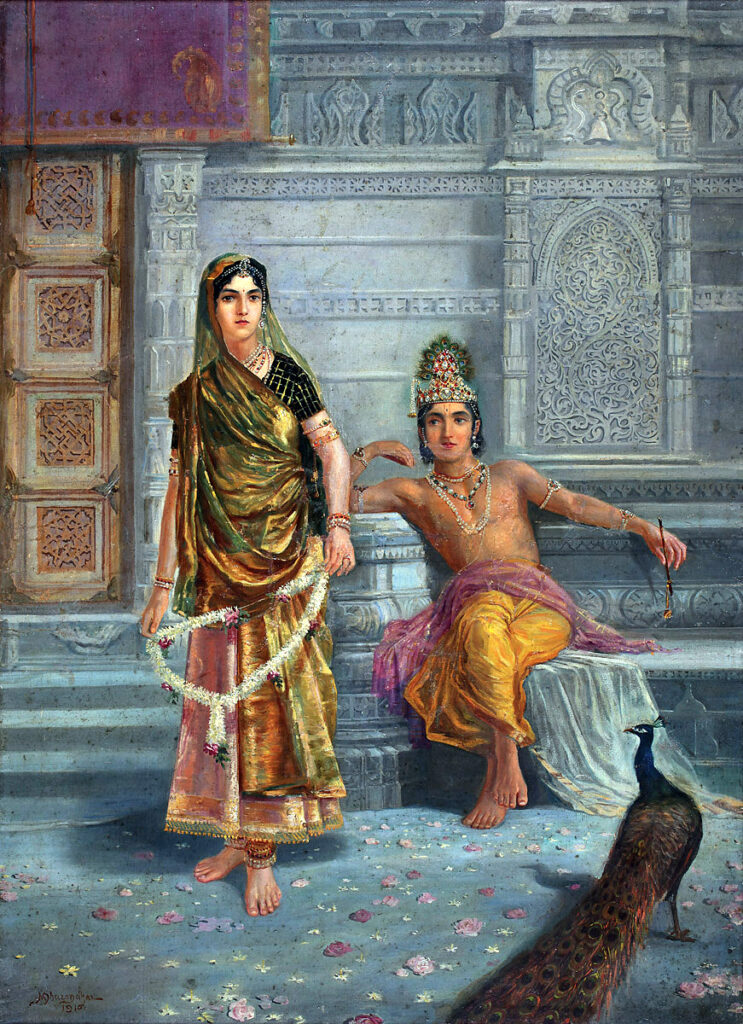
Due to Krishna’s special attention, Sri Radha began to consider herself the most fortunate among women. She requested Krishna to carry her on his shoulders, unable to walk further. Just then, Krishna vanished from her view. Troubled deeply, Srimati Radharani diligently searched for him, sharing her predicament with her gopi friends upon encountering them. All the gopis, in search of Krishna, ventured into the forest, following the moonlight’s path. Ultimately, their quest was fruitless, and they returned to the shores of Yamuna, resorting to singing Krishna’s glories in their utter helplessness.
As the Gopis’ minds spontaneously conjured up Krishna’s pastimes, they chanted a song that alleviated the searing anguish of separation, bestowing supreme auspiciousness. They sang, “O Lord, O lover, O deceiver, your smile, affectionate glances, and youthful exploits stir an intense turmoil within us. Your lotus face adorned with dusky locks bearing the dust of cows binds us irrevocably. The recollection of you, with tender feet accompanying the herds through forests, inflicts deep pain.”
In their separation from Krishna, the gopis perceived each moment as an eon. Even when they had earlier glimpsed him, the blink of their eyelids felt unbearable, momentarily obstructing their vision.
Though the ecstatic sentiments expressed by the gopis for Lord Krishna may seem akin to lust, in reality, they manifest their pure desire to gratify the Supreme Lord’s spiritual senses. These moods of the gopis contain not even a trace of lust.
Krishna’s Return: Gopis’ Longing Satisfied
Having fervently demonstrated their ardent yearning to see Krishna, the captivator of Cupid, the gopis witnessed his appearance clad in silken yellow attire and adorned with a magnificent flower garland. Some gopis, overwhelmed with ecstasy upon seeing him, clutched his hands, while others leaned his arm on their shoulders. A few even accepted the remnants of betel nut he had chewed, all in devoted service to him.
One gopi, propelled by affectionate indignation towards Krishna, bit her lip and glanced sideways at him. The gopis’ deep attachment to Krishna rendered continuous gazing at him unsatisfying. Hence, one among them internalized Krishna within her heart, closed her eyes, and repeatedly embraced him within her being, much like a yogi. Thus, the pain born of separation from the Lord dissolved.
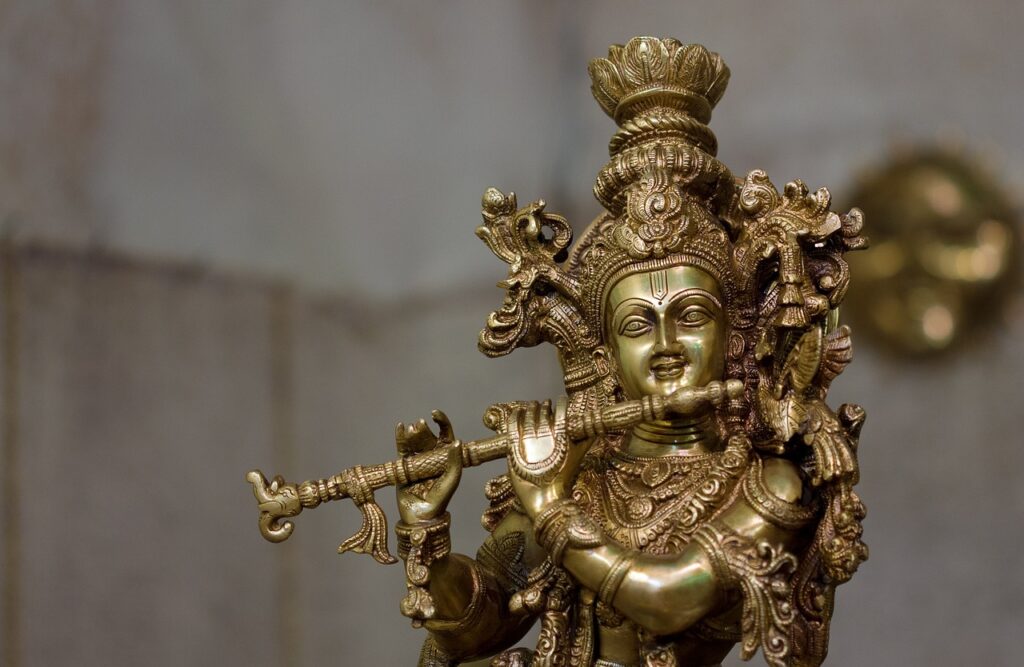
Subsequently, Lord Krishna, accompanied by the cowherd girls, his internal potencies, approached the banks of the Yamuna. There, the gopis fashioned a seat for Krishna from their shawls. After he settled, they engaged in amorous gestures and interactions. Despite this, the gopis still nursed the wound of Krishna’s disappearance. He elucidated the reason behind his vanishing, reassuring them that he had become subject to their exclusive loving devotion and would eternally remain indebted to them.
Rasa Dance – Enchanting Dance of Divine Love
By the banks of the Yamuna, Lord Govinda initiated the enchanting rasa dance, accompanied by the faithful gopis, who were treasures among women, their linked arms radiating joy. The festive rasa dance commenced with the gopis forming a circle. Lord Krishna expanded Himself and stepped between each pair of gopis. As the master of mystic powers, He encircled their necks with His arms, leaving each maiden with the impression that He stood solely by her side. Demigods and their consorts were consumed with eagerness to witness the rasa dance, filling the sky with innumerable celestial aircrafts. Kettledrums resonated in the heavens, petals rained down, and chief Gandharvas and their consorts sang the spotless glories of Lord Krishna. The jingle of the gopis’ armlets, ankle bells, and waist belts blended with their playfulness in the rasa dance. Amid the swirling gopis, Lord Krishna shone brilliantly, akin to a radiant sapphire amidst golden ornaments. As the gopis extolled Krishna, their feet swayed, hands gestured, and eyebrows arched with playful smiles. With their hair braids and belts firmly secured, waists swaying, brows glistening with sweat, garments shifting upon their bosoms, and earrings swaying on their cheeks, Krishna’s youthful consorts resembled streaks of lightning amid clouds. Filled with the fervor to experience conjugal love, their throats adorned with diverse pigments, the gopis sang with great ardor and danced. Krishna’s touch filled them with elation, and they sang songs that reverberated throughout the cosmos. United with Lord Acyuta as their intimate lover, the exclusive partner of the goddess of fortune, the gopis relished immense delight. Singing His praises, Krishna holding their necks with His arms, they adorned their faces with lotus flowers behind their ears, hair tendrils gracing their cheeks, and droplets of sweat. The clinking of their armlets and ankle bells created a harmonious symphony, while their floral garlands scattered. Thus, in the arena of the rasa dance, the gopis danced with the Supreme Lord, accompanied by the resonant melody of swarming bees. In this manner, Lord Krishna, the original Narayana, the master of the goddess of fortune, reveled in the company of Vraja’s young women, embracing them, caressing them, and casting affectionate smiles, much like a child at play with his own reflection. Manifesting as many forms as there were cowherd maidens, the self-contented Supreme Lord playfully relished the companionship of the gopis.The gopis did not perceive the mystical expansions of Krishna, for He manifested Himself individually to each of them. Every gopi believed that Krishna was dancing exclusively with her.
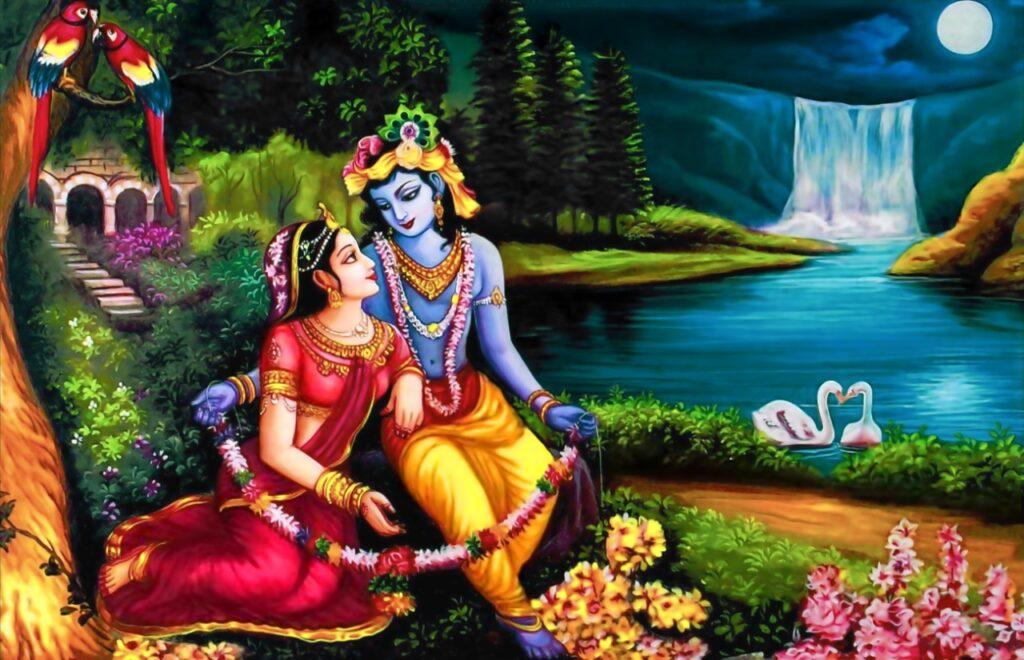
Observing the gopis’ fatigue from their amorous exchanges, benevolent Krishna gently wiped their faces with His soothing hand. The gopis graced their hero with affectionate glances, their cheeks adorned with beauty, their curly locks and glistening golden earrings illuminating their countenance. Overwhelmed by the touch of His fingertips, they chanted the auspicious transcendental pastimes of the Lord. Krishna’s garland, crushed during His romantic dalliance with the gopis, took on a new hue. To dispel the gopis’ fatigue, Krishna entered the waters of the Yamuna, trailed by bees that hummed like the finest Gandharvas. He resembled a majestic elephant entering the water to relax among his consorts. In truth, the Lord had transcended all conventional and Vedic norms, much like a robust elephant breaching the boundaries of a paddy field. My dear King, within the water, Krishna found Himself splashed from all directions by the giggling gopis, who looked at Him with adoration. As demigods offered worship by showering flowers from their celestial chariots, the self-satisfied Lord reveled in playful activity, resembling a king elephant. Krishna then strolled through a small forest on the Yamuna’s edge, where fragrant breezes carried the scents of land and aquatic flowers. Accompanied by a retinue of bees and exquisite women, Lord Krishna appeared like an intoxicated elephant in the midst of his she-elephants. After an entire Brahma’s night had transpired, Lord Krishna directed the gopis to return home, despite their reluctance. Anyone who intently hears or narrates the Lord’s playful exploits with the young gopis of Vrindavan will achieve pure devotional service to the Lord. In this way, they will swiftly overcome lust, the ailment of the heart.
Concluding words on Krishna’s Rasa Dance
Krishna’s rasa dance transcends the material realm entirely and should not be likened to anything in this worldly existence. To illustrate this Krishna manifested Himself in as many forms as there were Gopis. Krishna, the Supreme Lord, shares a unique relationship with each soul. However, the maidens of Vrindavan are esteemed by authorities as the most elevated, for they have selflessly forsaken everything, even their very existence, to bestow pleasure upon the Lord. Among these maidens, Radha rani stands as the foremost, existing solely to delight Madhava. It is with this devotional sentiment that one should approach and savor Krishna’s rasa dance. Therefore, it is recommended to peruse the preceding chapters of Srimad Bhagavatam before delving into the tenth canto, which narrates Krishna’s rasa dance.